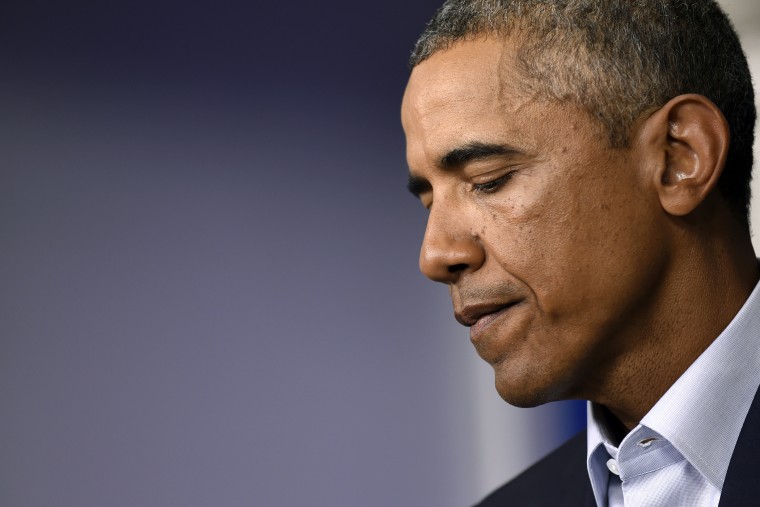President Obama will hold off on any executive action on immigration until after the November election, a White House official said on Saturday. The president still intends to take action on immigration before the year is out, extending the end-of-summer deadline he had previously set, according to the source.
While the White House emphasized concern for the integrity of the policy, political analysts are quick to point out that postponing any moves on immigration also protects vulnerable Democratic candidates for whom immigration would be a liability. NBC News' Luke Russert relayed tacit confirmation from a White House official to his query, "Red State Democrat?" as a factor in the decision.
Russert went on to explain that the nature of midterm elections, particularly in Republican-leaning states, is such that an action on immigration by the White House would be expected to motivate older, white voters to turn out against Democratic congressional candidates. That risk of backlash seems to have outweighed the potential benefit immigration reform would have provided in motivating Latino voters to support Democratic gubernatorial candidates like Tom Wolf in Pennsylvania and Charlie Crist in Florida.
MSNBC's Andrea Mitchell anticipated the announcement, explaining on The Rachel Maddow Show Friday night, that the White House doesn't "want to rock the boat right now for those Democrats in red states, except for Colorado, where there are tough races. All of the others, in Arkansas, in Louisiana, these are places that do not want a full-throated immigration debate before the election."
The decision to delay reform has drawn fire from both Republicans and advocacy groups supporting immigrants' rights.
Republican House Speaker John Boehner warned against declaring "amnesty by executive action" and added that "the decision to simply delay this deeply-controversial and possibly unconstitutional unilateral action until after the election — instead of abandoning the idea altogether — smacks of raw politics."
Senate Republication Leader Mitch McConnell also slammed Obama. "What's so cynical about today's immigration announcement is that the President isn't saying he'll follow the law — he's just saying he'll go around the law once it's too late for Americans to hold his party accountable in the November elections," he said.
McConnell's reaction dovetails with a central Republican campaign theme for 2014: What GOP lawmakers characterize as presidential overreach, exemplified by President Obama's announced intention to act unilaterally in the absence of participation by Congress.
However, in this case, Republicans have chosen not to acknowledge that they only recently called on Obama to do more without them — a declaration made just before Congress left for August recess. After Boehner failed to gain sufficient consensus among House Republicans to pass a border funding bill to address the influx of immigrants, he said at that time, "There are numerous steps the president can and should be taking right now, without the need for congressional action, to secure our borders and ensure these children are returned swiftly and safely to their countries."
Boehner's suggestion that the president take matters into his own hands came after Obama had already resolved in June to act on his own to address the issue, a decision the president attributed to the outright rejection by House Republicans of the Senate's bipartisan immigration bill.
In April, Boehner publicly mocked his House Republican colleagues for being unwilling to address immigration because they found the matter "too hard."
Democrats fired back at Republican criticism on Saturday for the new delay in immigration reform. "The GOP, the party that has blocked meaningful comprehensive immigration reform at every turn and sued the President for acting, is now outraged that he hasn't taken steps that many in their party deemed impeachable offenses," said Michael Czin of the Democratic National Committee.
"Their manufactured outrage would be easier to take if their Speaker didn't still have a bipartisan bill waiting on his desk gathering dust with no action. They can put an end to this," he added. "The bill is there. The votes are there. All they have to do is vote."
Saturday's announcement that immigration reform would be delayed also resulted in criticism from a number of advocacy groups.
Service Employees International Union President Mary Kay Henry and Executive Vice President Rocio Saenz reacted to the news with disappointment but acknowledged the political realities of the issue.
"We haven’t forgotten how we first got here," they said in a joint statement. "Republicans failed the American people by refusing to vote on meaningful immigration reform. Holding them accountable in November is a promise that we intend to keep."
In an excoriating statement, Erika Andiola, directors of the DREAM Action Coalition accused, "With this delay the president has broken yet another promise to the Latino community."
Frank Sharry, the executive director of the advocacy group America's Voice, was skeptical that the new end-of-year promise would be any more fruitful for their cause. "We are bitterly disappointed in the President and we are bitterly disappointed in the Senate Democrats. We advocates didn't make the reform promise; we just made the mistake of believing it," he said in a statement.
When asked directly about protecting Democratic candidates at Friday's press conference following the recent NATO summit in Wales, Obama avoided specifics on the timing of anything he would do, but spoke strongly about the detrimental effects of congressional inaction.
"What I am unequivocal about is that we need reform," the president said. "My overriding preference is to see Congress act. The House Republicans have sat on this for over a year. This has damaged the economy. It held America back. It is a mistake."
